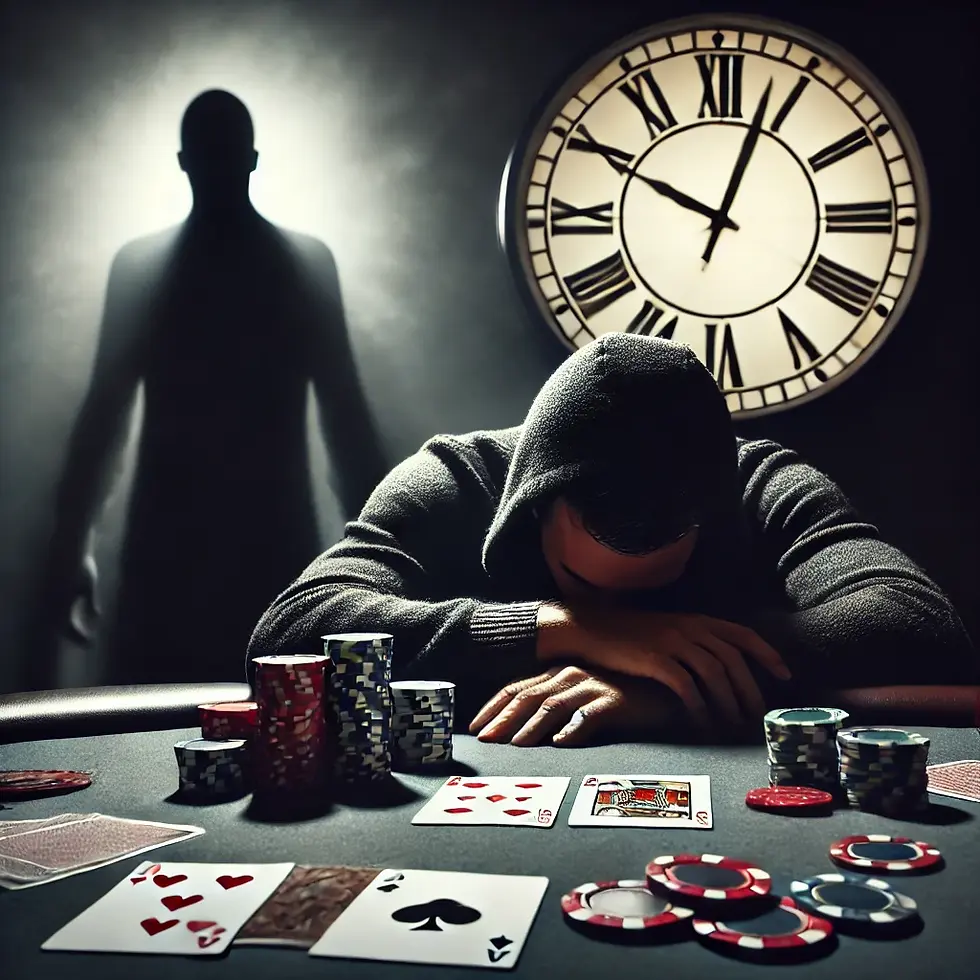10 Warning Signs of Gambling Addiction You Should Know
- Jan 7, 2025
- 3 min read

Gambling can be a fun and exciting activity for many people, but when it crosses into addiction, it can lead to devastating consequences. Gambling addiction is a serious issue that affects millions of individuals worldwide, causing financial ruin, emotional distress, and strain on relationships. Recognizing the warning signs of gambling addiction is crucial for early intervention and seeking help. Here are ten warning signs that you or someone you know might be struggling with gambling addiction.
1. Preoccupation with Gambling
One of the most obvious signs of gambling addiction is a constant preoccupation with gambling. A person addicted to gambling might frequently think about their next betting opportunity, obsessing over upcoming games, strategies, or the outcome of previous bets. If gambling dominates their thoughts to the point where it interferes with their daily life, it could be a sign of addiction.
2. Gambling More Money Than You Can Afford to Lose
Individuals with a gambling problem may gamble more than they can afford to lose. What starts as a small wager or a few dollars can escalate into larger and more frequent bets. As the addiction grows, so does the amount of money risked. This can result in significant financial debt, which may go unnoticed until it becomes unmanageable.
3. Chasing Losses
A hallmark of gambling addiction is the compulsion to "chase losses." This means continuing to gamble in an attempt to recover money that has already been lost. People often convince themselves that a big win is just around the corner, but chasing losses usually leads to deeper financial trouble and increased emotional distress.
4. Lying About Gambling Habits
People struggling with a gambling addiction may lie about their gambling habits. They might hide the extent of their gambling or downplay their losses to friends, family, or colleagues. The shame and guilt of their behavior can lead them to deny how much time and money they've spent on gambling.
5. Neglecting Responsibilities
Gambling addiction can cause individuals to neglect their responsibilities at work, school, or in their personal lives. They may miss important deadlines, appointments, or events because they are prioritizing gambling over their commitments. The inability to focus on responsibilities is a major red flag that gambling has taken over their life.
6. Using Gambling as an Escape
Many people with gambling addiction use it as a way to escape stress, anxiety, depression, or personal problems. They might gamble to forget their troubles or to feel a sense of excitement or control. This emotional escape mechanism often worsens the addiction, creating a cycle of reliance on gambling as a coping strategy.
7. Spending Increasing Amounts of Time Gambling
As gambling becomes a bigger part of their life, addicted individuals will often spend increasing amounts of time gambling. What was once an occasional hobby may turn into an all-consuming activity, leaving little room for other interests, relationships, or personal care. If gambling begins to dominate their time, it could signal a serious addiction.
8. Relationship Problems
Gambling addiction can cause severe strain on personal relationships. Loved ones may feel betrayed, hurt, and frustrated by the gambler's behavior. Constant financial issues, lies, and broken promises can lead to emotional distancing or even the breakdown of relationships. If gambling is causing conflict in relationships, it’s a strong indication that help is needed.
9. Financial Problems
Financial difficulties are a common consequence of gambling addiction. Individuals may find themselves dipping into savings, maxing out credit cards, or borrowing money from others to fund their gambling habits. In some cases, gambling addicts may even resort to illegal activities like theft or fraud to get more money for gambling. If you or someone you know is experiencing financial trouble due to gambling, it's important to address the issue before it spirals out of control.
10. Mood Swings and Irritability
Gambling addiction can cause significant mood swings and irritability. The highs and lows of winning and losing can lead to extreme emotional reactions. When a person loses a bet, they might feel angry, anxious, or depressed, and when they win, they might experience euphoria or overconfidence. These unpredictable mood changes can be exhausting and harmful to both the individual and those around them.
Recognizing the warning signs of gambling addiction is the first step toward recovery. If you or someone you know exhibits any of these behaviors, seeking help from a professional treatment center is essential. Gambling addiction is treatable, and with the right support, individuals can regain control of their lives. Early intervention is key to preventing further harm and beginning the journey toward recovery.
If you or a loved one are struggling with mental health issues, please give us a call today at 833-479-0797.




Comments